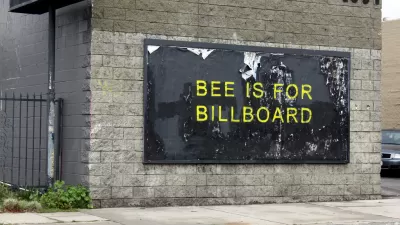L.A. is at war with outdoor advertising. Though activists have urged the city to make moves to block video billboards, it's not really clear which side is winning the war, according to this piece from Design Observer.
"For the last eight years Los Angeles has been engaged in a war with the outdoor advertising industry."
"As the lawsuits pass back and forth, the technology of outdoor advertising evolves, presenting new visual challenges for communities and endless opportunities for commercially bent designers. Giant whole-building vinyl supergraphic wraps, obscure skyscrapers and warehouses. One company with its roots in Los Angeles, SkyTag, claims their supergraphic wraps are so big they can be seen from space. Yet giant wraps and digital billboards that change messages every four to six seconds distract drivers, ramp up danger of vehicular collisions at intersections, obscure views and provide undesired night lighting in the bedrooms of residences hundreds of feet away. In the very near future, LED arrays mounted in the window walls of buildings will turn night skies into pulsing fields of light pollution. The stuff of science fiction less then a decade ago, holographic and "smart" billboards already tailor their messages to passing motorists and pedestrians using blue tooth and wireless technologies interacting with mobile phones and personal digital devices. The cacophony of existing and potential environmental information delivery can be exhilarating, if you are in the right mood; but more frequently it's exhausting and contributes to green house gas emissions (especially if you think about all that energy being used to power the digital signs). In Los Angeles, which has lost control of its visual environment, more and more people experience the presence of these extra-enabled billboards as an assault, yet another sign of private interests trumping the public good. In this Babylonic Empire of signs what little sense of the natural that is left, is pretty much diminished by the commercialization of every inch of urban space."
FULL STORY: A Babylon of Signs

Planetizen Federal Action Tracker
A weekly monitor of how Trump’s orders and actions are impacting planners and planning in America.

Congressman Proposes Bill to Rename DC Metro “Trump Train”
The Make Autorail Great Again Act would withhold federal funding to the system until the Washington Metropolitan Area Transit Authority (WMATA), rebrands as the Washington Metropolitan Authority for Greater Access (WMAGA).

The Simple Legislative Tool Transforming Vacant Downtowns
In California, Michigan and Georgia, an easy win is bringing dollars — and delight — back to city centers.

The States Losing Rural Delivery Rooms at an Alarming Pace
In some states, as few as 9% of rural hospitals still deliver babies. As a result, rising pre-term births, no adequate pre-term care and "harrowing" close calls are a growing reality.

The Small South Asian Republic Going all in on EVs
Thanks to one simple policy change less than five years ago, 65% of new cars in this Himalayan country are now electric.

DC Backpedals on Bike Lane Protection, Swaps Barriers for Paint
Citing aesthetic concerns, the city is removing the concrete barriers and flexposts that once separated Arizona Avenue cyclists from motor vehicles.
Urban Design for Planners 1: Software Tools
This six-course series explores essential urban design concepts using open source software and equips planners with the tools they need to participate fully in the urban design process.
Planning for Universal Design
Learn the tools for implementing Universal Design in planning regulations.
Smith Gee Studio
City of Charlotte
City of Camden Redevelopment Agency
City of Astoria
Transportation Research & Education Center (TREC) at Portland State University
US High Speed Rail Association
City of Camden Redevelopment Agency
Municipality of Princeton (NJ)



























